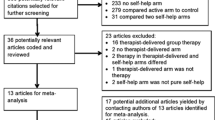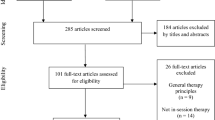Abstract
A review of the debate on the Empirically Supported Treatment Program is presented. It is argued that underlying the specifics of the debate are fundamentally incompatible paradigms: a meaning vs. a medical model. The findings from two “gold standard” multi-site studies are reviewed to conclude that the control condition meets requirements for an empirically supported treatment. The empirical finding of the failure of clinical training to improve treatment outcomes is explained by the focus on rational factors in training. It is recommended that training of therapists focus on enhancing experiential capacity rather than mastery of manualized treatment approaches.
Similar content being viewed by others
References
Beck, A. T., Ward, C. H., Mendelsohn, M., Mock J., & Erbaugh, J. (1961). An inventory for measuring depression. Archives of General Psychiatry, 4, 561–571.
Bohart, A. C., O’Hara, M., Leitner, L.M. (1998).Empirically violated treatments: Disenfranchisement of humanistic and other psychotherapies. Psychotherapy Research, 8, 141–157.
Bugental, J. (1987). The art of the psychotherapist. New York: W. W. Norton and Co.
Carroll, K. M. (1999). Old psychotherapies for cocaine dependence revisited. Archives of General Psychiatry, 56, 505–506.
Chambless, D. L., & Hollon, S. D. (1998). Defining empirically supported therapies. Journal of Consulting and Clinical Psychology, 66, 7–18.
Christensen, A., & Jacobson, N. S. (1994). Who (or what) can do psychotherapy: The status and challenge of nonprofessional therapies. Psychological Science, 5, 8–14.
Crits-Christoph, P., et al. (1999). Psychosocial treatments for cocaine dependence: National Institute on Drug Abuse Collaborative Cocaine Treatment Study. Archives of General Psychiatry, 56, 493–502.
Crits-Christoph, P., et al. (1998). Training in cognitive, supportive-expressive and drug counseling therapies for cocaine dependence. Journal of Consulting and Clinical Psychology, 3, 484–492.
Crits-Christoph, P., et al. (1997). The National Institute on Drug Abuse Collaborative Cocaine Treatment Study: Rationale and methods. Archives of General Psychiatry, 54, 721–726.
Derogatis, L. R., Lipman, R. S., & Covi, L. (1973). SCL-90: An outpatient psychiatric rating scale-preliminary report. Psychopharmacology Bulletin, 9, 13–28.
DeRubeis, R. J., & Crits-Christoph, P. (1998). Empirically supported individual and group psychological treatments for adult mental disorders. Journal of Consulting and Clinical Psychology, 66, 37–52.
Elkin, I., Parloff, M. B., Hadley, S. W., & Autry, J. H. (1985). NIMH treatment of Depression Collaborative Research Program: Background and research plan. Archives of General Psychiatry, 42, 305–316.
Elkin, I., et al. (1989). National Institute of mental Health Treatment of Depression Collaborative Research Ptrogram: General effectivess of treatments. Archives of General Psychiatry, 46, 971–982.
Elliott, R. (1998). Editor’s introduction: A guide to the empirically supported treatments controversy. Psychotherapy Research, 8, 115–125.
Endicott, J., Spitzer, R. L., Fleiss, J. L., & Cohen, J. (1976). The Global Assessment Scale: A procedure for measuring overall severity of psychiatric disturbance. Archives of General Psychiatry, 33, 766–771.
Frank, J. D. (1987). Psychotherapy, rhetoric, and hermeneutics: Implications for practice and research. Psychotherapy: Theory, Research, Practice, Training, 24, 293–302.
Goldfried, M. R., & Wolfe, B. E. (1998). Toward a more clinically valid approach to therapy research. Journal of Consulting and Clinical Psychology, 66, 143–150.
Hamilton, M. A. (1967). Development of a rating scale for primary depressive illness. British Journal of Social and Clinical Psychology, 6, 278–296.
Jacobson, N. S., & Hollon, S. D. (1996). Cognitive-behavioral therapy versus pharmacotherapy: Now that the jury’s returned its verdict, it’s time to present the rest of the evidence. Journal of Consulting and Clinical Psychology, 64, 74–80.
Kendall, P. C. (1998). Empirically supported psychological therapies. Journal of Consulting and Clinical Psychology, 66, 3–6.
Klein, D. F. (1996). Preventing hung juries about therapy studies. Journal of Consulting and Clinical Psychology, 64, 81–87.
Luborsky, L., et al. (1999). The researcher’s own therapy allegiances: A “wild card’’ in comparisons of treatment efficacy. Clinical Psychology: Science and Practice, 6, 95–106.
Shea, M. T., et al. (1992). Course of depressive symptoms over follow-up: Findings from the National Institute of Mental Health Treatment of Depression Collaborative Research Program. Archives of General Psychiatry, 49, 782–787.
Strupp, H. H., & Hadley, S. W. (1979). Specific vs. non-specific factors in psychotherapy. Archives of General Psychiatry, 36, 1125–1136.
Sue, S. (1999). Science, ethnicity, and bias: Where have we gone wrong? American Psychologist, 54, 1070–1077.
Task Force on Promotion and Dissemination of Psychological Procedures. (1995). Training in and dissemination of empirically-validated psychological treatments: Report and recommendations. The Clinical Psychologist, 48, 3–23.
Torrey, E. F. (1972). The Mind Game: Witchdoctors and Psychiatrists. New York: Emerson Hall Publishers.
Wampold, B. E., Mondin, G. W., Moody, M., Stich, F., Benson, K., & Ahn, H. (1997). A meta-analysis of outcome studies comparing bona fide psychotherapies: Empiricially, “all must have prizes.’’ Psychological Bulletin, 122, 203–215.
Wilson, G. T. (1996). Empirically validated treatments: Reality and resistance. Clinical Psychology: Science and Practice, 3, 24
Author information
Authors and Affiliations
Corresponding author
Rights and permissions
About this article
Cite this article
Honos-Webb, L. The Meaning vs. The Medical Model in the Empirically Supported Treatment Program: A Consideration of The Empirical Evidence. J Contemp Psychother 35, 55–65 (2005). https://doi.org/10.1007/s10879-005-0803-7
Issue Date:
DOI: https://doi.org/10.1007/s10879-005-0803-7




